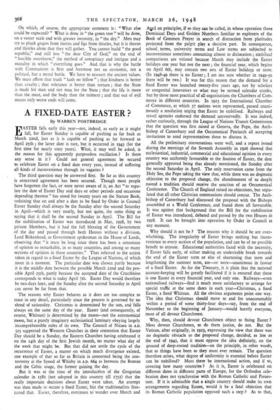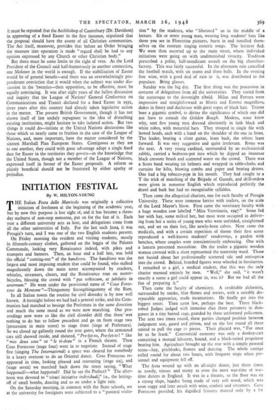A FIXED-DATE EASTER?
By WARREN POSTBRIDGE
EASTER falls early this year—not, indeed, as early as it might fall, for Easter Sunday is capable of pushing as far back as March 22nd, just as it is capable of pushing as far forward as April 25th ; the latter date is rare, but it occurred in 1943 (for the first time for nearly sixty years). What, it may well be asked, is the reason for this apparently purposeless oscillation ? Is there any sense in it ? Could not general agreement be secured to celebrate Easter on a fixed date every year, instead of suffering all kinds of inconvenience through its vagaries ?
The third question may be answered first. So far as this country is concerned agreement has been secured. Though most people have forgotten the fact, or were never aware of it, an Act "to regu- late the date of Easter Day and days or other periods and occasions depending thereon" has stood for twenty years on the Statute Book, ordaining that on and after a date to be fixed by Order in Council Easter. Sunday shall always be the Sunday after the second Saturday in April—which is very nearly, but not quite, the same thing as saying that it shall be the second Sunday in April. The Bill for the stabilisation of Easter was introduced in May, 1928, by two private Members, but it had the full blessing of the Government of the day and passed through both Houses without a division, Lord Birkenhead, as Government spokesman in the House of Lords, observing that "it must be long since there has been a consensus of opinion so remarkable, in so many countries, and among so many sections of opinion in those countries." That referred to the action taken in regard to a fixed Easter by the League of Nations, of which more in a moment. The particular date was chosen partly because it is the middle date between the possible March 22nd and the pos- sible April 25th, partly because the accepted date of the Crucifixion corresponds to what is today April 7th. Easter Day would therefore be two days later, and the Sunday after the second Saturday in April can never be far from that.
The reasons why Easter behaves as it does are too complex to trace in any detail, particularly since the process is governed by no shred of rationality. Christmas is determined by the sun, and falls always on the same day of the year. Easter (and consequently, of course, Whitsun) is determined by the moon—not the astronomical moon, but a purely imaginary ecclesiastical luminary obeying largely incomprehensible rules of its own. The Council of Nicaea in A.D. 325 supported the Western Churches in their contention that Easter Day should be a Sunday, the Eastern Churches having celebrated it on the 14th day of the first Jewish month, no matter what day of the week that might be. But that did not settle the cycle of the recurrence of Easter, a matter on which much divergence existed, one example of that so .far as Britain is concerned being the con- troversy at the Synod of Whitby in A.D. 664 as between the Roman and the Celtic usage, the former gaining the day.
But it was at the time of the introduction of the Gregorian calendar in 1582 (not adopted in this country till 1752) that the really important decisions about Easter were taken. An attempt was then made to secure a fixed Easter, but the traditionalists frus- trated that. Easter, therefore, continues to wander over March and Awil on principles, if so they can be called, in whose operation those Dominical Days and Golden Numbers familiar to explorers of the Book of Common Prayer in search of distraction from platitudes projected from the pulpit play a decisive part. In consequence, school. terms, university terms and Law terms are subjected to inconvenience sometimes amounting almost to dislocation ; statistical comparisons are vitiated because March may include the Easter holidays one year but not the next ; the financial year, which begins on April 6th, may contain two sets of Easter holidays or none. (In 1948-49 there is no Easter ; I am not sure whether in 1949-50 there will be two.) It was for this reason that the demand for a fixed Easter was launched twenty-five years ago, not by scholars or congenital innovators or what may be termed calendar cranks, but by those most practical of all organisations the Chambers of Com- merce in different countries. In 1923 the International Chamber of Commerce, at which 37 nations were represented, passed unani- mously a resolution urging that Easter be stabilised. Railways and travel agencies endorsed the demand unreservedly. It was indeed, rather curiously, through the League of Nations Transit Commission that the question was first raised at Geneva, the Pope, the Arch- bishop of Canterbury and the Oecumenical Patriarch all accepting invitations to send representatives there to discuss it.
All the preliminary conversations went well, and a report issued during the meetings of the Seventh Assembly in 1926 showed that ecclesiastical, industrial, commercial and educational opinion in every country was uniformly favourable to the fixation of Easter, the date generally approved being that already mentioned, the Sunday after the second Saturday in April. The only reservation came from the Holy See, the Pope taking the view that, while there was no dogmatic objection to the proposed change, the abandonment of so deeply rooted a tradition should receive the sanction of an Oecumenical Conference. The Church of England raised no objections, but stipu- lated that all other Christian communions should concur. The Arch- bishop of Canterbury had discussed the proposal with the Bishops assembled at a World Conference, and found them all favourable. It was against that background that the Bill for the stabilisation of Easter was introduced, debated and passed by the two Houses in 1928. It can be brought into operation by Order in Council at any moment.
Why should it not be ? The reasons why it should be are over- whelming. The irregularity of Easter brings nothing but incon- venience to every section of the population, and can be of no possible benefit to anyone. Educational authorities faced with the necessity, if Easter falls early, of either making an undesirable break towards the end of the Easter term or else of shortening that term and lengthening the summer term, are—or were—unanimous in favour of a fixed Easter. As for the Treasury, it is plain that the national account-keeping will be greatly facilitated if it is ensured that there is one Easter in every financial year, and only one. Railways—even nationalised railways—find it much more satisfactory to arrange for special traffic at the same dates in each year—Christmas, a fixed Easter, a fixed Whitsun. All the obvious arguments point one way. The idea that Christmas should move to and fro unaccountably within a period of some thirty-four days—say, from the end of November to the beginning of January—would horrify everyone, most of all devout Churchmen.
Why, then, should devout Churchmen object to fixing Easter ? Most devout Churchmen, to do them justice, do not. But the Vatican, after originally, in 1923, expressing the view that there was no dogmatic obstacle to the proposed change, decided, as late as the end of 1942, that it must oppose the idea definitely, on the ground of deep-rooted tradition—on the principle, in other words, that as things have been so they must ever remain. The question therefore arises, what degree of uniformity is essential before Easter can be stabilised? Must there be international action, and if so, covering how many countries ? As it is, Easter is celebrated on different dates in different parts of Europe, for the Orthodox cele- bration does not synchronise with the Roman Catholic and Protes- tant. If it is admissible that a single country should make its own arrangements regarding Easter, would it be a fatal objection that its Roman Catholic population opposed such a step ? As to that, It must be repeated that the Archbishop of Canterbury (Dr. Davidson) in approving of a fixed Easter in the first instance, stipulated that the proposal should have the assent of all Christian communities. The Act itself, moreover, provides that before an Order bringing the measure into operation is made "regard shall be had to any opinion expressed by any Church or other Christian body."
But there must be some limits to the rigj3t of veto. As the Lord President of the Council said half-humorously in another connection, one Molotov in the world is enough. If the stabilisation of Easter would be of general benefit—and there was an overwhelmingly pre- ponderant conviction that it would when the subject was under dis- cussion in the 'twenties—then opposition, to be effective, must be equally convincing. It was after eight years of the fullest discussion and inquiry that the League of Nations' General Conference on Communications and Transit declared for a fixed Easter in 1931, three years after this country had already taken legislative action in the matter. The present British Government, though it has not shown itself of late unduly repugnant to the idea of disturbing existing institutions, might hesitate to take isolated action. But two things it could do—initiate at the United Nations discussions like those which so nearly came to fruition in the case of the League of Nations, and, more important, have the matter considered by the sixteen Marshall Plan European States. Contiguous as they are to one another, they could with great advantage adopt a single fixed date for Easter in the territories they govern—in the knowledge that the United States, though not a member of the League of Nations, expressed itself in favour of the Easter proposals. A reform so plainly beneficial should not be frustrated by either apathy or prejudice.



































 Previous page
Previous page